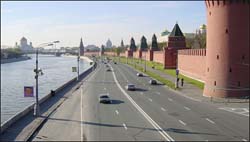 MOSCOW - THE ACKNOWLEDGED LEADER
MOSCOW - THE ACKNOWLEDGED LEADER |
The city of Moscow has become the acknowledged leader
in modern day economic reforms in Russia. Indeed,
Russia's future starts in Moscow. Russia's largest
financial centre controls some 60 percent of the
country's capital, collects as much as 80 percent
of Russia's taxes and contributes some 30 percent
of the Federal Budget. Furthermore, Moscow has the
most developed banking infrastructure, big insurance
companies and investment funds, consulting and marketing
companies.

83% of total Russian bank assets, 97% of the federal
budget demand balance, 94% of investments into state
securities, 54% of deposits owned by legal entities
are concentrated in the banks of the Moscow area
(the city of Moscow and the region). Concentration
of the banking capital in Moscow is not explained
by the fact that credits to and investments into
the regions are less attractive. The reason for
this concentration is that the Moscow banks "are
closer to the power center". The funds of the
federal budget have circulated through metropolitan
banks for ten years. It was the Moscow banks that
had the easiest access to refinancing from the Bank
of Russia. In addition, such speculative markets
as the foreign exchange and stock markets are also
located in Moscow, and Moscow banks enjoy the easiest
access to them.
|
Moscow forms the largest
market in Russia with its consumer market accounting
for some 28 percent of total Russian goods turnover.
It is in Russia's capital where the demand for most
new goods and services is born. Even though a lot
of companies are looking to discover the region,
none of the regions boast the numbers of Moscow.
Moscow attracts some 57 percent of all foreign investment
into Russia. Together with Moscow region, the capital
accounts for 17.6 percent of all investments into
Russia. The city is also one of the leaders in terms
of per capita investments. The metropolis is the
only location where this indicator had steadily
grown in 1995-2000, having reached 17.6 thousand
rubles per Muscovite in 2000 (the Russian average
being 8 thousand rubles). The share of budgetary
investment financing is high in Moscow.
Finally, Russia's impressive capital is the biggest
national industrial center and has an immense pool
of skilled labor. Reason for this is that Moscow
is the beacon of intellectual capital development
in Russia. As Sergei Nederoslev, President of Russian
aviation company Kaskol rightfully stresses, "There
is no country worldwide whose future is not in its
intellectual capital. If they do not develop it,
they will not be able to speak of the 'future'".
The levels of education in Russia are certainly
high by any standard, and the importance of Moscow
and the Moscow region is clear. One fifth of all
Russian scientific organizations are concentrated
and one fourth of all national scientific projects
are implemented near Moscow. More than 50 percent
of all Russian scientific centres are located in
the Moscow region. The most successful ones are
those in Dubna, Korolev, Pushchino, Protvino, Zhukovsky,
Troitsk, Chernogolovka, and Khimki.
|

